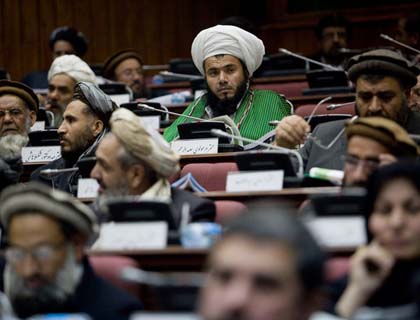KABUL - Some parliamentarians on Sunday identified government interference as the main reason behind the Wolesi Jirga's inefficiency. However, the government rejected the allegation.
The parliamentary election was held on September 18, 2010, but results were announced two months later. Finally, the lower house was inaugurated by President Hamid Karzai on January 26, 2011 after widespread demonstrations and vote-rigging allegations.
Ahmad Behzad, the second deputy speaker, said it was a year that the lower house began its second term but it had done nothing special due to continuing illegal actions of the government.
Behzad told Pajhwok Afghan News no one reserved the right to alter poll results, but the government did so and unseated a number of parliamentarians.
The house has been divided into several groups and the Law Enforcement Support Coalition (LESC), which constitutes a majority with 104 members, is up against the government to defend laws and independence of the legislative branch, he added.
Reformists, a pro-government group, claim some members of the LESC have also joined them. If the international community honored its promises made to Afghans and did not support government interference in parliamentary affairs, the house would be able to perform its duties over the next four years, Behzad said.
Shakiba Hashimi, a public representative from southern Kandahar province, also alleged the government had been interfering in parliamentary affairs since the inauguration of chamber.
Establishment of the Special Election Tribunal, not introducing cabinet members to the house for a vote of confidence and issuing "dark decrees" were some examples of the government interference, she said. "If the speaker had not been weak, the current crisis would have never happened."
Hashimi explained swearing in nine new parliamentarians and giving additional salaries to acting ministers were amongst the president's dark decrees.
The Wolesi Jirga was holding its sessions normally, but the crisis erupted after the Special Poll Tribunal, tasked with probing election irregularities, was set up illegally by the Supreme Court and approved by President Karzai.
Soon after its establishment, the court ordered a vote-recount across the country and finally declared 62 failed candidates as winners. The announcement triggered tensions between government branches.
Karzai eventually authorized Independent Election Commission ('IEC) to resolve the issue. The IEC unseated nine MPs and ordered their replacement with candidates who were previously declared failed.
But Hamid Elmi, the deputy presidential spokesman, rejected the allegations of MPs that the government was interfering in parliamentary affairs. He said the government was trying to make sure the three branches worked in coordination.
Aryan Yoon, a representative of eastern Nangarhar province, accused neighboring countries and some other circles of interference in the Wolesi Jirga. She said: "There are groups in parliaments around the world, but when it comes to their national interests, they work unanimously. However, some parliamentary groups in Afghanistan are working against the national interests and are dependent on other countries."
Without elaborating, she agreed the house had done nothing for the benefit of the nation since its inauguration. "The Wolesi Jirga has made every decision in light of personal sentiments and grudges."
Daud Kalakani, another parliamentarian from Kabul, said the main reason that led to the current crisis was insecurity during the parliamentary election. "The electoral law should be amended." He said the house had approved a number of laws at the beginning, but it faced problems later.

